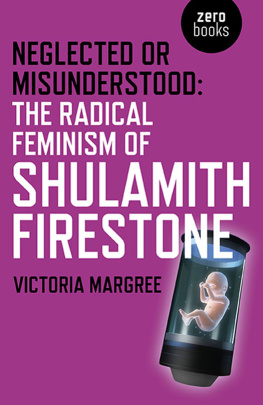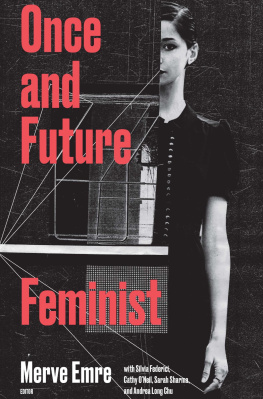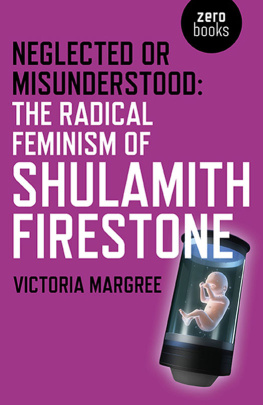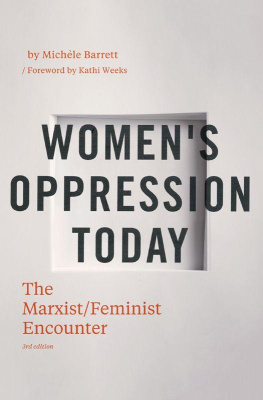WHAT PEOPLE ARE SAYING ABOUT
Neglected or Misunderstood: The Radical Feminism of Shulamith Firestone
Clear-eyed, pedagogical and contemporary, Victoria Margrees reading of Firestone will be of use to anyone thinking about feminism and technology today. Providing clear historical and philosophical context, Margree provides a supremely balanced account of Firestone in all her complexity. With reference to other great feminist thinkers, the womens political movement, as well as recent developments in reproductive technology, Margrees book brings Firestone firmly up-to-date.
Nina Power, author of One Dimensional Woman
Questioning, rigorous, yet accessible, this is an important contribution to the current reconsideration of the demonized visionary of Second Wave feminism. With careful attention to its intellectual influences and analytical coherence, Victoria Margree offers a lucid exposition of Shulamith Firestones argument against the power imbalances created by maternity. As the conservative challenge to contraception and abortion intensifies in Europe and the US, Margree concludes with an invaluable discussion of the post-Firestone politics of reproduction.
Mandy Merck, Co-Editor, Further Adventures of the Dialectic of Sex
First published by Zero Books, 2018
Zero Books is an imprint of John Hunt Publishing Ltd., No. 3 East Street
Alresford, Hampshire SO24 9EE, UK
www.johnhuntpublishing.com
www.zero-books.net
For distributor details and how to order please visit the Ordering section on our website.
Text copyright: Victoria Margree 2017
ISBN: 978 1 78535 539 4
978 1 78535 540 0 (ebook)
Library of Congress Control Number: 2016962872
All rights reserved. Except for brief quotations in critical articles or reviews, no part of this book may be reproduced in any manner without prior written permission from the publishers.
The rights of Victoria Margree as author have been asserted in accordance with the Copyright, Designs and Patents Act 1988.
A CIP catalogue record for this book is available from the British Library.
Design: Stuart Davies
Printed and bound by CPI Group (UK) Ltd, Croydon, CR0 4YY, UK
We operate a distinctive and ethical publishing philosophy in all areas of our business, from our global network of authors to production and worldwide distribution.
Contents
To my parents, for loving us for our own sakes
Acknowledgments
This book comes out of ten years experience of teaching Shulamith Firestone to undergraduates on the Humanities Programme at the University of Brighton. I have many people to thank individually. Samantha Goodyer first suggested the project to me, for which I am deeply grateful. I have enjoyed great conversations about Firestone with Joanne Tutt, David Martin and Gill Scott. Antonia Hofstaetter gave helpful feedback on some early material for the book and I have valued her interest and encouragement. In particular, I would like to thank Gurminder Bhambra, Bob Brecher and Michael Neu, for their support and friendship, and for their invaluable feedback and suggestions on drafts. All mistakes that remain are my own. And I thank my partner, Moritz Schick, for supporting me in the project even when I have no doubt become something of a Firestone bore. But Id also like to thank the generations of students for the stimulating and revealing classroom conversations from which my own ability to think through the challenges posed by Firestones work has benefited in incalculable ways.
Introduction: In Defense of Science Fiction
How can men be mothers! How can some kid who isnt related to you be your child? How could anyone know what being a mother means who has never carried a child nine months heavy under her heart, who has never borne a baby in blood and pain, who has never suckled a child.
(Marge Piercy)
An inhabitant of 1970s New York, Connie Ramos has been telepathically transported to a future society in which pregnancy and childbirth have been eliminated. Children are grown from embryos in artificial wombs and are raised by multiple mothers not genetically related to them, and who may be either men or women. Connie has responded with curiosity but by no means hostility to many aspects of this brave new world, but as the door of the brooder tank slides back, revealing seven human babies joggling slowly upside down, each in a sac of its own inside a larger fluid receptacle, her mouth gapes and her stomach turns. That biological motherhood itself could be expropriated from women fills her with revulsion.
Yet this is no dystopian vision, but a utopian one. And despite Connies fears about male encroachment upon the unique capacity of women, it is a feminist one. It is drawn from Marge Piercys 1976 novel Woman on the Edge of Time, which imaginatively creates the future society sketched out in Shulamith Firestones feminist manifesto, The Dialectic of Sex: The Case for Feminist Revolution.
Firestones book burst onto the emerging feminist scene in 1970 and proved immediately controversial. Its main thesis is that the origin of womens oppression lies in biology itself. For Firestone, it is precisely the fact that it is women and not men who gestate a child, give birth in blood and pain, and shape their lives around another dependent human being that gives rise to male domination. This biological difference, she argues, divides humanity into two classes that are not equal, and this fundamental inequality then reproduces itself remorselessly at all levels of society. If Firestones analysis was stark, then her solution was revolutionary: since it is biology that is the problem, then biology must be changed, through a technological intervention that would begin with contraception and abortion but would end in the option of completely removing the reproductive process from womens bodies. The Dialectic of Sex proposes a post-revolutionary world in which human society has been transformed in order to deliver women, children and ultimately also men from the tyranny of an oppression that is rooted in biology. The nuclear family will have been disbanded. Human beings will live together in households of seven to ten adults. Children need not be genetically related to any of these parents but will be raised by all, and will enjoy unprecedented freedoms. Machines will have rendered alienated labor obsolete, freeing people to pursue activities of their own choosing. Sexual difference itself will have been eliminated.
The radical feminism of Shulamith Firestone
This book argues for a return to Firestone. Today, nearly half a century after the Dialectics first publication, a resurgent feminism is again addressing the questions that Firestone raised. These are questions about the impact upon women of their role in procreation. But they are also questions about the arrangements in which we all cohabit, work, love and have sex. Who can be a mother? What does the nuclear family mean, for those both within and without one? What might be the effects of cybernetics on employment? What effects do ideas of romance and the erotic have upon our lives?
With the republication of The Dialectic of Sex by Verso in 2015, Firestones text is now easily accessible to a new generation of readers.
To return to Firestone is, however, to reclaim a book that fellow feminist Ann Snitow has characterized as a demon text of second wave feminism. The Dialectic of Sex










